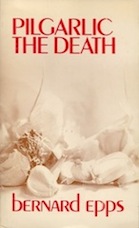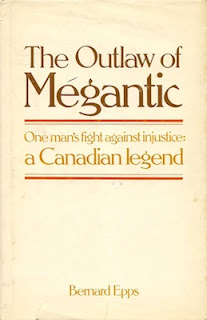Something strange stumbled upon yesterday, this list intended for "people in other countries interested in Canadian literature" from the 1 May 1948 edition of the Ottawa Citizen. Odd and awkward, it was cobbled together at the behest of UNESCO by a committee of eight: E.K. Brown, Philip Child, William Arthur Deacon, F.C. Jennings, Watson Kirkconnell, Lorne Pierce, B.K. Sandwell and W. Stewart Wallace. How anti-commie kook Kirkconnell justified his participation I cannot say.*
The headline in the Citizen is deceiving. Yes, it's meant to be a list of the 100 best, but there are eleven too many. Most of the overrun comes courtesy of Mazo de la Roche's Whiteoak Chronicles, which then numbered ten volumes. The others? Well, one might just be Tom MacInnes' Collected Poems, which doesn't exist.
As I say, odd and awkward. William Osler didn't write The Master Word, but he was the author of The Master-Word in Medicine; Joseph Schull's The Legend of Ghost Lagoon is listed as The Legend of Lost Lagoon; and poor B.K. Sandwell suffers the indignity of being called B.S. Sandwell.
"A list of Canadian books of special merit written in French is also to be compiled by a similar committee", we're told. By whom? Who knows. I find no trace of the committee or its list. What we're to make of the inclusion of Pierre Esprit Radisson's Voyages – recorded as Voyages of Peter Esprit Radisson – on the English-language list I cannot say.
Despite the flaws, it's all good fun... for me, at least. So many unfamiliar titles, so many unfamiliar names and so much to explore, the list begins with a forgotten collection of short stories by Will R. Bird:
The Strait of Anian – Earle Birney
Brown Waters – W.H. Blake
North Atlantic Triangle – John Bartlet Brebner
A Dryad in Nanaimo – Audrey Alexandra Brown
James Wilson Morrice – Donald W. Buchanan
The Search for the Western Sea – Lawrence J. Burpee
Now That April's Here – Morley Callaghan
Poetical Works of Wilfred Campbell – Wilfred Campbell
Bliss Carman – James Cappon
Bliss Carman's Poems – Bliss Carman
Klee Wyck – Emily Carr
Jean Racine – A.F.B. Clark
Christianity and Classical Culture – Charles Norris Cochrane
Postscript to Adventure – Ralph Connor
Father on the Farm – Kenneth C. Cragg
Collected Poems of Isabella Valancy Crawford – Isabella Valancy Crawford
The Diary of Samuel Marchbanks – Robertson Davies
The Government of Canada – Robert MacGregor Dawson
Whiteoak Chronicles – Mazo de la Roche
The Law Marches West – Cecil E. Denny
Complete Poems – William Henry Drummond
Grand River – Mabel Dunham
The Art of the Novel – Pelham Edgar
A Study on Goethe – Barker Fairley
Poems – Robert Finch
Fearful Symmetry – Northrop Frye
Arctic Trader – Philip H. Godsell
Napoleon Tremblay – Angus Graham
 Earth and High Heaven – Gwethalyn Graham
Earth and High Heaven – Gwethalyn GrahamPilgrims of the Wild – Grey Owl
Fruits of the Earth – Frederick Philip Grove
Over Prairie Trails – Frederick Philip Grove
A Search for America – Frederick Philip Grove
Brave Harvest – Kennethe M. Haig
Sam Slick – Thomas Chandler Haliburton
All the Trumpets Sounded – W.G. Hardy
Saul – Charles Heavysege
The Drama of the Forests – Arthur Heming
Father Lacombe – Katherine Hughes
Winter Studies and Summer Rambles in Canada – Anna Brownell Jameson
Wanderings of an Artist among the Indians of North America – Paul Kane
Lord Elgin – W.P.M. Kennedy
The Golden Dog – William Kirby
Bride of Quietness – Alexander Knox
Selected Poems of Archibald Lampman – Archibald Lampman
Lake Huron – Fred Landon
Leacock Roundabout – Stephen Leacock
Sunshine Sketches of a Little Town – Stephen Leacock
From Colony to Nation – A.R.M. Lower
Out of the Wilderness – Wilson MacDonald
Collected Poems – Tom MacInnes
The Honourable Company – Douglas MacKay
Barometer Rising – Hugh MacLennan
Tales of the Sea – Archibald MacMechan
Lord Strathcona – John MacNaughton
The Master's Wife – Andrew Macphail
In Pastures Green – Peter McArthur
The Champlain Road – Franklin Davey McDowell
The Unguarded Frontier – Edgar McInnis
Who Has Seen the Wind – W.O. Mitchell
Roughing It in the Bush – Susanna Moodie
Gauntlet to Overlord – Ross Munro
Lord Durham – Chester W. New
Mine Inheritance – Frederick Niven
Pindar – Gilbert Norwood
The Master Word – William Osler
A Book of Canadian Stories – Desmond Pacey
When Valmond Came to Pontiac – Gilbert Parker
The Complete Poems of Marjorie Pickthall – Marjorie Pickthall
Collected Poems – E.J. Pratt
Voyages of Peter [sic] Esprit Radisson – Pierre Esprit Radisson
His Majesty's Yankees – Thomas H. Raddall
Wisdom of the Wilderness – Charles G.D. Roberts
The Leather Bottle – Theodore Goodridge Roberts
The Incomplete Anglers – J.D. Robins
Toronto During the French Regime – Percy J. Robinson
As for Me and My House – Sinclair Ross
Confessions of an Immigrant's Daughter – Laura Salverson
Flashing Wings – Richard M. Saunders
Legend of Lost [sic] Lagoon – Joseph Schull
The Poems of Duncan Campbell Scott – Duncan Campbell Scott
In the Village of Viger – Duncan Campbell Scott
Wild Animals I Have Known – Ernest Thompson Seton
The Diary of Mrs. John Graves Simcoe – Elizabeth Simcoe
Man's Rock – Bertrand W. Sinclair
Egerton Ryerson – C.B. Sissons
Life and Letters of Sir Wilfrid Laurier – Oscar Douglas Skelton
The Yellow Briar – Patrick Slater
Policing the Arctic – Harwood Steele
Sir Frederick Banting – Lloyd Stevenson
The Friendly Arctic – Vihjalmur Stefansson
Under the Northern Lights – Alan Sullivan
Plowing the Arctic – G.J. Tranter
Salt, Seas and Sailormen – Frederick William Wallace
James Wolfe – W.T. Waugh
The Owl Pen – Kenneth McNeill Wells
The Birth of Language – R.A. Wilson
The Canadians – George M. Wrong
The Rise and Fall of New France – George M. Wrong
What, no Wacousta?
I've read six.
* "At the close of the Second World War, the Russians took a leading part, along with 'capitalist imperialists,' in organizing another League of Nations, the so-called 'United Nations.' and the Communist Party of the U.S.A. joined in a psalm of praise over the new turn in policy."
– Watson Kirkconnell, "Communism in Canada and the United States",
Canadian Catholic Historical Association Report 15 (1947-1948)






































